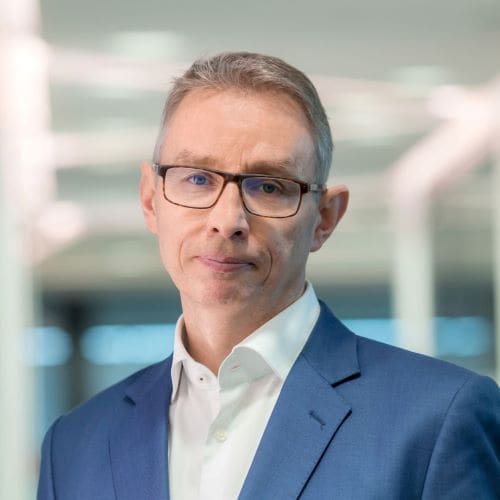CEE webcast
CEO Survey insights and actions —Charting a new path for growth in CEE
This webcast explored the central themes of this year’s survey findings—business model reinvention and artificial intelligence.
Adam Krasoń, PwC CEE CEO, presented the insights from the CEE edition of the Survey and Agnieszka Gajewska, PwC CEE Clients & Markets Leader, led a panel discussion which offered practical advice on how to build trust in AI and power up reinvention in different industries.
Thanks to our panel of CEE business leaders:
Igor Tóth, CEO, O2 Slovakia
Joanna Simonowicz, Managing Director, Froo Romania
Michaela Bauer, Chief Innovations and Operations Officer, ČSOB Czechia.
Missed the event? Watch the highlights.
This year’s regional results of our Global CEO Survey highlight the urgency of reinvention and a growing recognition of the need to embrace strategic change, sustainability and innovation—particularly AI, which is yielding early benefits.

"Business leaders in Central and Eastern Europe are realising they need to change and adapt. Although they are generally optimistic about the near future, more than half of CEOs worry about whether their companies can survive under their current business models. By using AI responsibly and focusing on sustainability, I’m optimistic that CEE businesses can not only prepare for the future but actively shape it."
While CEOs in CEE recognise the importance of innovation and reinvention, this has yet to translate into major changes to business models. On average just 5% of revenues in CEE companies have been generated from new business areas in the last five years.
Companies would do well to speed up on reinvention now—a series of incremental changes aren’t enough. The responsible deployment of AI presents real opportunities and many CEOs in the region are already exploring its possibilities. However, the vast majority are not 'all in' on AI—only 13% (significantly less than 24% globally) report AI will be scaled into core business strategy.
In this report, we will explore CEOs’ insights on business model reinvention, economic outlook, AI, and sustainability, as well as suggest some key considerations for creating new value.
Report highlights
Reinvention: An intensified imperative but limited in speed and scope
Reinvention is top of mind for an ever-increasing proportion of CEOs in CEE. Over half—10% higher than the global average—believe their business will not be economically viable in ten years' time if it continues on its current path.
If your company continues running on its current path, for how long do you think your business will be economically viable?

As many as 72%—more than the global average of 63%—of CEE business leaders have taken at least one significant action on how their company creates, delivers and captures value. More than 40% have developed innovative products and services—and almost one-third are targeting new customer bases and routes to market. Such single actions are welcome, but cannot substitute for a systemic approach to reinvention.
To what extent has your company taken the following actions in the last five years? (Showing only ‘To a very large extent’ and ‘To a large extent’ responses)

Industry reconfiguration is influencing competitive dynamics and this is likely to intensify. In the last five years, 38% of CEE companies have begun competing in new sectors.
Sector boundaries are blurring. 38% of CEE CEOs say their company has begun competing in new sectors in the last five years. The top three sectors being real estate (17%), technology (16%) and transportation and logistics (15%).
Many CEE companies, however, appear to provide the same products and services. Only one-third of those competing in new sectors and industries see related returns of over 20%. This suggests the majority might need to focus more on reinvention, not just on market expansion.
Key considerations

"Adaptation and innovation are not merely optional, but essential for survival and success. For the first time, over half (52%) of CEOs in CEE recognise the urgent need for business model reinvention. While some are already implementing reinvention actions—the scope and pace are insufficient. Proactively capturing new opportunities, reallocating resources efficiently and refining decision-making processes are ways business leaders in our region can drive not only short-term success but also survival in the mid to long term."
Economic outlook: A notable rise in optimism
Optimism regarding economic growth has increased significantly compared to the previous two years. CEOs in CEE report more positive expectations than their global counterparts on average.
How do you believe economic growth (i.e., gross domestic product) will change, if at all, over the next 12 months in the global economy?

How do you believe economic growth (i.e., gross domestic product) will change, if at all, over the next 12 months in your territory economy?

This is also reflected in a steady level of confidence regarding prospects for revenue growth. 39% of CEOs in CEE (38% globally) are extremely or very confident about their company's prospects over the next 12 months.
Many chief executives in CEE report positive trends in their companies:
How exposed do you believe your company will be to the following key threats in the next 12 months?

The top three reported near-term threats to business in CEE remain the same as last year—geopolitical conflict, macroeconomic volatility and inflation. Inflation, the main threat identified in 2024 at 40%, has eased somewhat into third place at 31%.
Previous CEO Surveys tell us the economic environment is inherently unpredictable and confidence levels on economic growth can change starkly year-on-year.
AI: An increasing part of everyday business
Only two years since AI appeared on the agenda of most executives, around half of CEOs in CEE say it has helped to report increase efficiency in how they and their employees spend their time.
More than 25% say their company’s profitability has increased—and one-fifth report revenue growth impacted by GenAI.
However, GenAI adoption in CEE in the last year didn’t lead to a reduction in jobs as some expected. Last year, 18% of CEOs in CEE expected headcount to decrease in connection with GenAI, but only 8% report that it happened. Also, 13% reported that GenAI influenced their headcount increasement.
To what extent will/did generative AI increase or decrease the following in your company in the next/last 12 months? (27th and 28th Annual Global CEO Surveys) (Showing only % who answered ‘Increase significantly,’ ‘Increase moderately’ and ‘Increase slightly’)

Expectations for GenAI for the next 12 months remain high. As many as 40% of regional CEOs expect GenAI to increase the profitability of their company in the year ahead.
Companies tend to limit integration of AI to technological domains, rather than scaling it business-wide. Approaching four in ten CEOs in CEE plan to integrate AI into tech platforms (39%) as well as business processes and workflows (36%).
Fewer are planning to use AI in workforce and skills strategy (28%) and in new product or service development (26%). Only 13% predict AI will be included in core business strategy in the next three years which is significantly lower than the global average of 24%.
To what extent, if at all, do you predict AI (including generative AI) will be systematically integrated into the following areas in your company in the next three years? (Showing only ‘To a very large extent’ and ‘To a large extent’ responses)

Key considerations

“One crucial way of building trust is to invest in the digital upskilling of employees to effectively implement and manage AI technologies. Also, collaborating with consultants with a proven track record of delivering bespoke, AI-enabled solutions can provide great insights for a successful, safe and responsible integration of AI into core business strategies.”
Sustainability: Finding a better cost/revenue balance
Around one-third of CEOs in CEE state that climate-friendly investments have increased costs in the last five years, but almost the same proportion reported increased revenue from such investments, which is very similar to global average.
To what extent have climate-friendly investments initiated by your company in the last five years caused increases or decreases in the following?

Business leaders in the region have a cautious approach to sustainability investments. One-third say their companies did not accept lower rates of return for climate-friendly investments, while only 15% prioritise environmental goals even when returns are below the usual threshold.
CEOs in CEE say the three biggest barriers to climate-friendly investments in the region are regulatory complexity (with 58% saying it affected investment to a moderate, large or very large extent; 48% globally), a lack of demand from external stakeholders (46% versus 44% globally) and lack of available finance (44% compared to 43% globally).
Key considerations

“Embedding climate adaptation and sustainability in their core business strategy should be a no-regret action for CEE businesses. As the global report shows—this effort and related investments can pay back not just in terms of revenue but also in gaining resilience, enhanced competitiveness and brand recognition.”
About the survey
We surveyed 4,701 CEOs in 109 countries and territories from 1 October through 8 November 2024, including 153 CEOs from Central and Eastern Europe. The global and regional figures in this report are weighted proportionally to individual country nominal GDP so CEOs’ views are broadly representative across all major regions. The industry and country-level figures are based on unweighted data from the full sample of 4,701 CEOs. All quantitative interviews were conducted on a confidential basis.
Contact us


Agnieszka Gajewska
Global Government & Public Services Leader, CEE Clients & Markets Leader, PwC Central and Eastern Europe
Tel: +48 517 140 537





